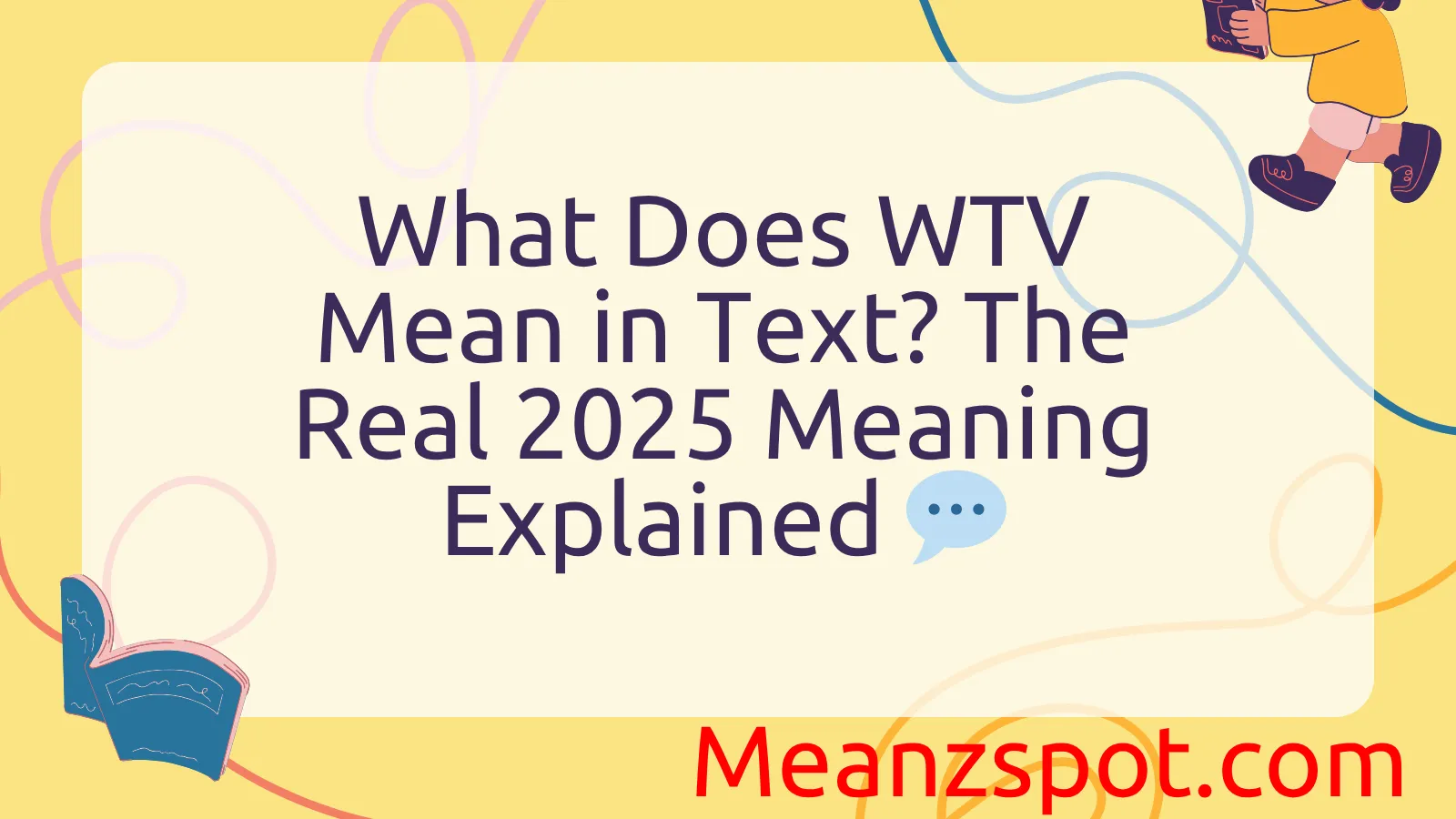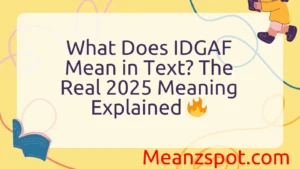Ever seen someone reply with “WTV” and wondered what they meant? You’re not alone — this short and snappy slang has taken over texts, DMs, and TikTok comments in 2025.
Simply put, “WTV” stands for “Whatever.” It’s a casual, laid-back way to say you’re not too bothered or that something doesn’t matter much. Depending on tone and context, it can sound chill, sarcastic, or even dismissive — so it’s all about how you use it.
From “WTV, I’m done arguing” to “Sure, WTV you say”, this trendy abbreviation perfectly fits the quick-reply culture of online chats. In 2025, WTV has become a go-to phrase for people who want to keep it cool, effortless, and drama-free.
Definitions & Meaning
WTV is an abbreviation commonly used in texting and online messaging, and it stands for “whatever.” It is a casual way to express indifference, dismissal, or a lack of concern about something. For example, if someone says, “I don’t really care what movie we watch,” they might simply reply with “WTV” to indicate they have no strong preference.
The tone behind WTV can vary:
- Casual indifference: “WTV, I’m fine with anything.”
- Dismissive or annoyed: “WTV, do what you want.”
- Playful or joking: “You’re late again? WTV, I’m used to it.”
Because it is informal, WTV is rarely used in formal or professional communication. Instead, it is popular among friends, on social media, and in quick conversations where typing out “whatever” feels too slow.
Origins & History
The use of abbreviations in texting has been around since the early days of SMS messaging, when character limits encouraged brevity. The term “whatever” itself has been part of English slang since the mid-20th century, gaining popularity especially among youth culture as a way to show apathy or defiance.
The shorthand WTV likely emerged organically as people looked to shorten “whatever” in text form. It fits the pattern of dropping vowels or compressing words to save time, like “btw” for “by the way” or “idk” for “I don’t know.” The exact moment WTV was first used is unclear, but by the 2000s, it was commonly seen in chat rooms, texting, and early social media platforms.
Today, WTV is part of a larger culture of internet slang that evolves quickly. New abbreviations appear and fade as communication trends shift, but WTV remains widely understood due to its simplicity and usefulness.
Usage in Different Contexts
Social Media & Texting
On platforms like Instagram, Twitter, or Snapchat, WTV is often used in casual conversations or comments. For example, a user might reply “WTV” to a friend who is debating what to eat for dinner, signaling that they don’t have a strong opinion.
Professional or Formal Settings
WTV is generally inappropriate in professional emails, reports, or meetings because it can come across as rude or unprofessional. If a colleague says “WTV” in a work chat, it might be interpreted as dismissive or disrespectful. Instead, more polite phrases like “I’m flexible” or “I’m open to suggestions” are preferred.
Pop Culture
The word “whatever” gained mainstream attention in the 1990s and early 2000s, often associated with teenage rebellion or sarcasm, especially after movies like Clueless popularized the catchphrase. Using WTV in texts echoes that same casual, sometimes cheeky vibe, linking digital communication back to cultural attitudes around apathy or indifference.
Common Misunderstandings & Clarifications
One common misunderstanding is interpreting WTV as neutral or friendly when it might actually convey annoyance or dismissal. For example, if someone texts “WTV” after you suggest plans, they might mean they don’t care — but the tone can feel hurtful or abrupt.
Another confusion arises with similar acronyms like WT (what) or WTH (what the hell), which have very different meanings. It’s important to pay attention to context and the relationship between speakers to understand the intended tone.
Finally, some might assume WTV is universally understood, but older generations or people unfamiliar with texting slang may not recognize it, which can lead to miscommunication.
Alternatives & Synonyms
If you want to express indifference or a casual tone but avoid potential misunderstandings, here are some alternatives to WTV:
- Whatever: The full word, less ambiguous and clearer in tone.
- IDGAF: Stands for “I don’t give a f***,” much stronger and more vulgar.
- I don’t mind: Polite and clear.
- It’s up to you: Shows willingness to defer to the other person.
- No preference: Neutral and professional.
- Meh: Informal way to show indifference or boredom.
Choosing the right alternative depends on your audience and the tone you want to set.
Frequently Asked Questions (FAQ)
1. Is WTV rude?
It can be, depending on context and tone. Sometimes it sounds dismissive or uninterested.
2. Can I use WTV in professional emails?
No, it’s best to avoid slang like WTV in formal communication.
3. What’s the difference between WTV and whatever?
WTV is a shorthand abbreviation of whatever; the meaning is the same, but WTV is more casual.
4. Is WTV used worldwide?
Mostly in English-speaking countries, but internet slang often crosses borders.
5. Are there other meanings of WTV?
Rarely, but in texting, it almost always means “whatever.”
6. How should I respond if someone texts me WTV?
Consider the tone — if it seems dismissive, you might want to clarify or change the subject.
7. Is WTV the same as ‘wtv’?
Yes, capitalization doesn’t change the meaning.
Conclusion
Understanding what WTV means and how it’s used can help you navigate modern digital conversations more smoothly. It’s a quick, casual way to say “whatever,” expressing indifference or dismissal depending on tone and context. While it’s widely used among friends and on social media, it’s important to be cautious with its tone and avoid it in professional settings.
Knowing the origins and alternatives also equips you to communicate clearly and respectfully. Next time you see or use WTV, you’ll know exactly what’s being conveyed — saving you from confusion and helping you connect better in the fast world of texting and online chats.



